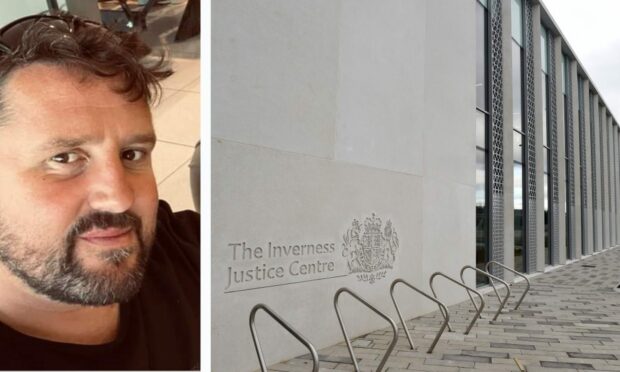A man who made a threatening video to kill his brother-in-law has walked free from court today after being acquitted of committing a crime.
Inverness Sheriff Court was played the footage of 40-year-old Christopher Barclay making the threats, stating he would “kill” businessman Norman Bremner, adding: “I don’t care if I go to jail.”
Mr Barclay had denied behaving in a threatening or abusive manner likely to cause a person fear and alarm by posting the video to his social media page.
The case collapsed after the Crown failed to prove that the accused, from Boggiwell, Craigland, Fortrose, had posted the video on social media.
During the video, which was sent to Mr Barclay’s sister Paula by someone else on January 28 last year, he says: “I am so excited. I can’t wait. I am going to punch f**k out of you.
“I am going to smash you myself so badly. You are a dead man. If I kill you I don’t care if I go to jail.”
Tearful evidence from sister
Mrs Bremner broke down in tears during the trial at Inverness Sheriff Court.
She told fiscal depute Naomi Duffy-Welsh: “I was in bed when I got a message and I went into pure fear and devastation that such lies could be said about Norman and the threats.
“Threats had been made before but it was the first time I had seen the person’s face.”
She added that her brother was blaming her husband for being bad “to my mother.”
She also confirmed the video was not sent to her by her brother.
Mr Bremner told the court: “We were very alarmed and upset by it and we called the police.”
At the end of their evidence, defence solicitor John MacColl stood up to address Sheriff Ian Cruickshank, who said: “I know what is coming next.”
No case to answer
Mr MacColl then said he was putting in a “no case to answer” submission.
He added: “No doubt your lordship will take a dim view of what was in the video.
“There is footage of my client in the video but there is no evidence of where it was made or when or that he posted it to his social media page.
“The crime is not the making of the video. It is not a crime for him having it, albeit unsavoury as it may be. The crime is the posting and sending of it.”
Ms Duffy-Welsh asked the sheriff to “draw an inference that it was in the public domain” and suggested she would amend the charge if the sheriff repelled Mr MacColl’s submission.
Sheriff Cruickshank asked the prosecutor: “Where is the evidence that he posted it to his social media page?”
He added that the police could have investigated that aspect.
“I have no alternative but to uphold the no case to answer plea,” the sheriff said, before telling Mr Barclay he was being found not guilty and free to go.
